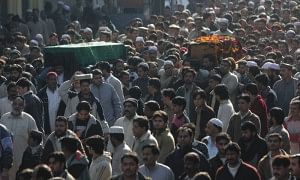'Pak vote needs delay to avoid chaos'

Mourners carry the coffins of people who died in the attack on former Pakistani prime minister Benazir Bhutto during a funeral ceremony in Rawalpindi yesterday. Assassinated Benazir was laid to rest in her family's ancestral graveyard to scenes of searing emotion from hundreds of thousands of mourners. Photo: AFP
Pakistan should delay next month's parliamentary elections to prevent a meltdown in the nuclear-armed nation following the assassination of opposition leader Benazir Bhutto, analysts say.
The United States called on Pakistan on Thursday to hold its election as scheduled on January 8 as a tribute to Benazir, who was slain by a suicide attacker at a campaign rally.
But Asia-watcher Brian Katulis, who returned last week from a 15-day trip to Islamabad, Karachi and Lahore, said Pakistan would be better off if the election was postponed and that Washington should drop its insistence that it go ahead as planned.
"Delaying the vote would open the door to not only de-escalating the situation but also to having a better process than if we just go forward," he told AFP.
Putting off the election could also help to patch up the badly bruised image of the United States in Pakistan.
"Pakistanis don't have a lot of love for the United States. If the US blindly supports moving forward with the elections, given the deep scepticism about those elections and the scepticism about Pakistani institutions being able to deliver the basics needed to survive, like wheat and bread, that further widens the divide," Katulis said.
"Our fetish with elections does not help us."
Katulis, of the Centre for American Progress think tank, warned that forging ahead with the election could result in more violence and deaths.
"I attended a rally and the security situation is just impossible. You have thousands of people who show up, allegedly because they get money -- they're very poor," he said.
"If they don't have a postponement, we're likely to have more of these problems.
"We need to encourage postponing the elections, but it has to be a closed-end postponement, during which a list of things need to get done, including the restoration of the judiciary," he said.
Daniel Markey, of the Council on Foreign Relations, called Benazir's assassination "a bad day for Pakistan and the United States" that was likely to throw off the election process.
"The government of (President) Pervez Musharraf has over time expressed concern about their ability to hold elections without a great deal of violence and this was just another indication of what they're dealing with," he told reporters.
"There is every chance that the government will seek to delay the election. ... Everything is too messy to move forward," Markey said.
"The worst case scenario is that the level of violence gets out of hand, the army is not able to control it and breaks down. This sort of tragic event raises the stakes for something like that to materialize," he said.
Anthony Cordesman, an expert at the Centre for Strategic and International Studies, a Washington think tank, called on Pakistan's leaders to show unity in the face of the tragedy.
"A great problem is going to be whether Pakistan's leaders will see this as a reason to come together and make compromises or see it as a reason on the part of Musharraf to crack down on security, and on the part of leaders like Nawaz Sharif to attack the Musharraf government," he said.
"We'll get preliminary indications soon but historically the implications of something like this tend to play out over a period of months," he added.
Markey said Benazir's death had robbed Pakistan of a rare chance of edging closer to democracy.
"The election in early January had the potential to take the country forward, at least haltingly or slowly, towards a more manageable civilian-military partnership to rule the country, and Benazir would have been a significant part of that," he said.

 For all latest news, follow The Daily Star's Google News channel.
For all latest news, follow The Daily Star's Google News channel. 



Comments